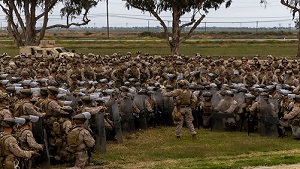According to Charles Tjatindi, a Political Journalist with the Namibian Broadcasting Corporation, the atmosphere across Namibia is calm, with no reports of significant violence or hate speech. He noted that during the campaign period, political parties have largely adhered to rules of conduct, ensuring a fair and orderly process. "Life goes on as usual in most parts of the country, even in rural areas where I am currently," Tjatindi said. “People are busy with their daily activities but are aware that on November 27, they will need to make their voices heard at the ballot box.”
The Electoral Commission of Namibia (ECN) has confirmed its preparedness for the upcoming elections. The ECN has held several press conferences over the past few weeks, reassuring the public that all logistical and procedural measures are in place. Ballots have already been inspected and delivered, with a particular focus on ensuring transparency throughout the process.
"The delivery of ballots from South Africa (SA) has been smooth, and the political parties have signed a code of conduct, pledging to maintain a peaceful environment during the elections," Tjatindi explained.
In a notable development, Namibia recently held its special voting exercise, allowing security personnel and others working on election day, including those abroad, to cast their votes early. Special voting stations were set up at Namibia’s embassies in Pretoria and Cape Town, as well as at other diplomatic missions. "This served as a test run for the ECN to gauge their readiness, and the process went well," Tjatindi commented.
The upcoming elections are expected to see significant competition, with 11 parties vying for the presidential and parliamentary seats. While it is difficult to predict the exact outcome, Tjatindi pointed out that past records suggest that the ruling party, the South West Africa People’s Organisation (SWAPO), remains a strong contender. "SWAPO will be hoping to secure another term in office, telling voters that they still have unfinished business and need more time to deliver on their promises," he said.
Another key player in the race is the Independent Patriots for Change (IPC), led by Dr. Panduleni Itula, who is running for president for the second time. Itula, a former SWAPO member, made a strong showing in the 2019 elections despite running as an independent candidate. This year, he has the backing of the IPC, which has positioned itself as a serious alternative to SWAPO.
Political analysts on the ground are divided on the potential outcomes. Some suggest that SWAPO may see a decline in its vote share, particularly due to growing discontent with its long-standing dominance. However, others caution that Namibia’s political dynamics are unique, and the outcome may not mirror trends seen in neighboring countries like SA, Botswana, or Malaysia, where ruling parties have faced significant challenges in recent years.
As election day approaches, the mood remains cautiously optimistic. Namibia's strong democratic traditions and commitment to peaceful elections are expected to guide the country through this pivotal moment.
For now, Namibians are preparing to exercise their right to vote, with the hope that the upcoming elections will reflect the will of the people and usher in a new chapter of governance.
--ChannelAfrica--













